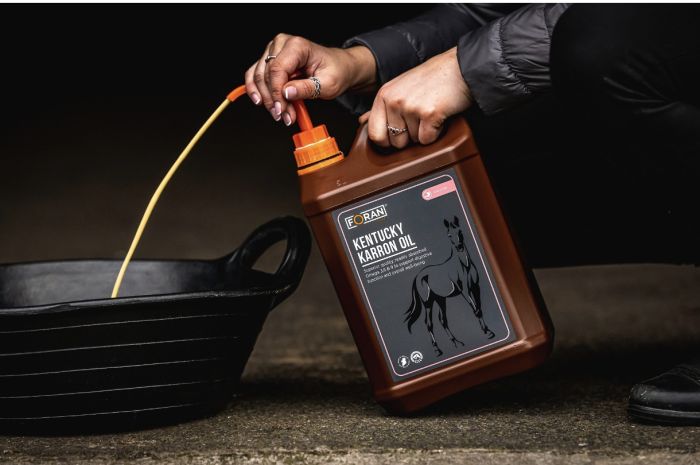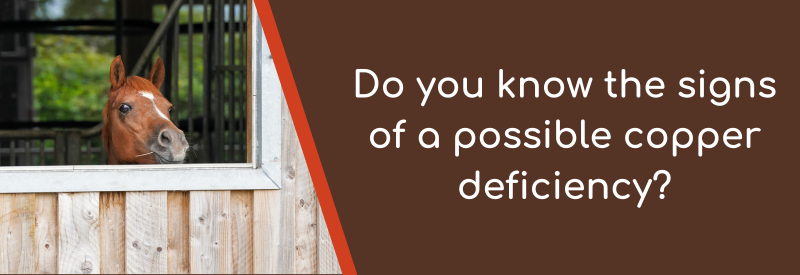Do you know your carrons from your coppers?
The Importance of Carron Oil and Copper in a Horse's Diet
When it comes to looking after our horses, as owners and carers, we all know how vital it is to ensure they receive the right nutrients for their health and well-being. While the basics like hay, grass, and water often take centre stage, it’s the more specific additions—like Carron Oil and Copper—that can truly elevate a horse's diet. These may not always be the first supplements we think of, but they certainly play a significant role in supporting the overall health of our horses.
So, why are these two elements so important? Let’s take a closer look at what Carron oil and copper can do for our equine companions.
Carron Oil: The Unsung Hero of Equine Nutrition

Carron oil is a relatively simple yet powerful supplement made from high-quality, cold-pressed linseed (flaxseed) oil. It’s packed with omega-3 and omega-6 fatty acids, making it a fantastic addition to any horse’s feed, particularly for those with specific health needs or performance requirements.
The Benefits of Carron Oil for Horses:
- A Glossy Coat and Healthy Skin: Carron oil is most commonly praised for improving the condition of a horse’s coat and skin. The omega fatty acids help to nourish the skin from within, promoting a shiny, soft coat and reducing any flakiness or dryness. It’s particularly helpful during the colder months when horses might struggle with dull coats and flaky skin due to the harsh weather.
- Stronger Hooves: If you’ve ever had issues with brittle hooves, Carron oil could be the answer. The fatty acids in Carron oil contribute to overall hoof health, making hooves stronger and more resilient to cracking or splitting. For horses that spend a lot of time in hard, dry conditions or on tough surfaces, adding Carron oil to their diet can be a game-changer.
- Joint Support and Reduced Inflammation: Omega-3s are well-known for their anti-inflammatory properties, which is a big bonus for horses suffering from joint issues, arthritis, or general aches and pains. The inclusion of Carron oil in your horse's diet can help reduce inflammation and support joint mobility, especially in older horses or those that work at high intensity.
- Improved Energy Levels: Carron oil provides a slow-release source of energy due to its high fat content, which is metabolised at a steady rate, helping to maintain energy levels without causing spikes in blood sugar. This makes it an ideal supplement for performance horses or those involved in long-duration activities, like eventing or endurance riding.
- Digestive Health: Omega-3 fatty acids also support digestive health, so horses prone to colic or digestive upset could benefit from the addition of Carron oil to their feed. It helps to regulate gut function and can promote a more comfortable digestion process.

Copper: A Crucial Trace Mineral for Horses
Copper is an essential trace mineral that plays a critical role in many bodily functions. It’s involved in the production of red blood cells, the formation of bone and connective tissue, and the function of the immune system. While copper is required in very small amounts, a deficiency can lead to significant health problems in horses.

The Benefits of Copper in a Horse's Diet:
- Healthy Bones and Joints: Copper is essential for the formation of collagen, which is a protein found in connective tissue, including bones and cartilage. Horses that are deficient in copper may struggle with bone development and joint issues, particularly growing horses or those in heavy work. Ensuring proper copper levels can help support healthy bone growth and joint integrity.
- A Shiny Coat: Copper plays a role in melanin production, the pigment responsible for coat colour. Horses with a copper deficiency often have dull or faded coats. Ensuring a horse is getting enough copper can help bring back that natural shine and improve the overall quality of their coat, leaving them looking their best.
- Red Blood Cell Production: Copper is a key component in the formation of haemoglobin, which carries oxygen in the blood. Without enough copper, a horse can become anaemic, which often results in fatigue, lethargy, and reduced performance. Supplementing with copper ensures that your horse can produce enough healthy red blood cells to keep them feeling energetic and strong.
- Immune System Health: Copper is essential for maintaining a healthy immune system, which helps horses fight off infections and recover from illnesses more efficiently. Horses under stress, or those exposed to high-risk environments, are particularly vulnerable to copper deficiency, which can impair their immune responses.
- Wound Healing and Tissue Repair: Copper plays an important role in tissue repair, so horses recovering from injuries or surgeries will benefit from proper copper levels. It helps with the regeneration of tissue and the formation of scar tissue, making the healing process faster and more effective.
Striking the Right Balance

Both Carron oil and copper are excellent additions to a horse's diet, but balance is key. Too much or too little of either could cause problems.
For Carron oil, it's typically added at a rate of a few tablespoons per day, depending on the size and workload of your horse. However, it’s best to introduce it gradually into their feed and adjust the quantity based on their specific needs. A quick chat with your vet or an equine nutritionist will help you pinpoint the ideal dosage.
Copper supplementation is often required for horses that are on diets low in copper or are living in areas with copper-deficient soils. Your vet will be able to carry out a blood test to determine if your horse is deficient and advise on the right supplement.
Final Thoughts
Incorporating Carron oil and copper into your horse’s diet can make a noticeable difference to their overall health, appearance, and performance. Whether you’re looking to improve coat condition, support joint health, or ensure your horse’s nutritional needs are met, these two supplements provide essential benefits.
As always, it’s important to consult with your vet before introducing any new supplements to your horse’s diet. With the right guidance, you’ll be able to give your horse the best possible care and keep them looking and feeling their best all year round.











